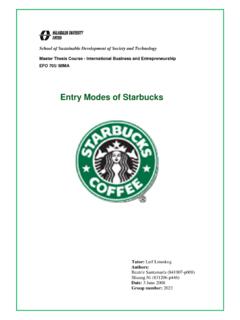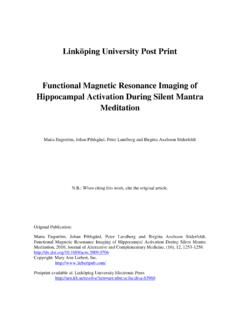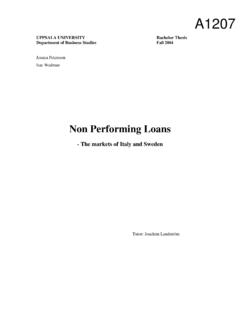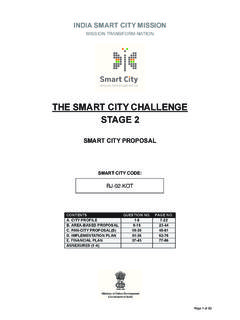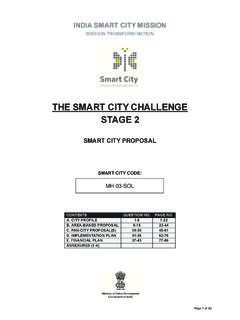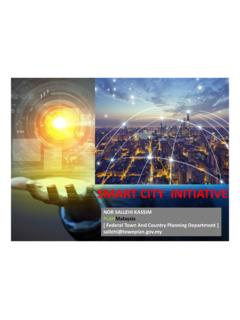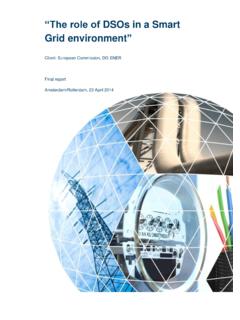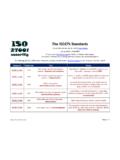Transcription of Smart Cities: Strategic Sustainable Development for an ...
1 Master's Degree Thesis Examiner: Professor G ran Broman Supervisor: Professor Karl-Henrik Rob rt Primary advisor: Tamara Connell Secondary advisor: Pierre Johnson Smart cities : Strategic Sustainable Development for an Urban World School of Engineering Blekinge Institute of Technology Karlskrona, Sweden 2013 Caroline Colldahl Sonya Frey Joseph E. Kelemen Smart cities : Strategic Sustainable Development for an Urban World Caroline Colldahl Sonya Frey Joseph E. Kelemen School of Engineering Blekinge Institute of Technology Karlskrona, Sweden 2013 Thesis submitted for completion of Master of Strategic Leadership towards Sustainability, Blekinge Institute of Technology, Karlskrona, Sweden. Abstract: Global urbanisation trends and pressing issues around sustainability pose great challenges for cities . The Smart city concept has been developed as a strategy for working with cities as they become systematically more complex through interconnected frameworks, and increasingly rely on the use of Information and Communication Technology to meet the needs of their citizens.
2 This thesis explores the concept of Smart cities as a potential urban construct that can address the social and ecological sustainability challenges which society faces. Smart cities are defined as cities where investments in human and social capital, and traditional and modern communication infrastructure fuel Sustainable economic growth and a high quality of life, with a wise management of natural resources, through participatory governance. Through structured interviews with Smart city practitioners and sustainability experts, the strengths and limitations of the Smart city concept are identified and organised through the Framework for Strategic Sustainable Development (FSSD). Then, a Strategic Sustainable Development (SSD) approach is applied as a method to maximise the benefits of the concept, and to mitigate any identified limitations. This thesis recommends a planning guide, informed by an SSD approach, to help Smart cities move strategically towards their Smart city vision and also move society towards sustainability.
3 Keywords: Smart City, Sustainability, Strategic Sustainable Development , Citizen Participation, ICT, Strategic Planning Process iii Statement of Contribution This thesis has been achieved through a collaborative method from the three members of the group who came together through the shared desire to study cities in a sustainability context. All members made a significant and equal contribution enabling the finalisation of this project. By bringing our personalities, motivations and previous experiences together, we all contributed in our own unique manner and complemented one another. Her verbal and written communication skills allowed Caroline to contribute to the content of meetings, advisory correspondence and the detailed editing of the thesis through diligence and attention to detail. Due to his strong organisational skills, critical thinking and experience in leadership, Joseph structured and organised our work processes, established a continuous work discipline and ensured the production of our deliverables.
4 With strong analytical skills, reliability and her ability to multitask, Sonya contributed to the significance of our report with devotion and enthusiasm, and maintained the link between our thesis team and our advisors. We all co-created the design of the three phases of our research and throughout the whole process all decisions were consensus-based and tasks were divided equally amongst us. We worked very closely together and made sure to continuously support and guide each other, and keep a wonderful and loving atmosphere within the group. Sonya Frey Joseph E. Kelemen Caroline Colldahl iv Acknowledgements This thesis would not have been possible without the help, support, and guidance of several key people. We would like to express our gratitude to everyone who has been part of our thesis journey.
5 We would like to formally acknowledge and thank the many urban practitioners who generously provided us with their time, information, and insights about their work within their respective cities . Also, to all the sustainability practitioners, near and far, thank you for deepening our knowledge on what a Sustainable city can truly look like. A special thank you to our thesis advisors, Tamara Connell and Pierre Johnson, for providing us with support and guidance along this thesis process. We appreciate all the time you have spent helping us develop our ideas and giving us valuable feedback. Thank you to the MSLS staff at Blekinge Institute of Technology, for teaching and motivating us, and for granting us this unforgettable experience. To the founders, G ran Broman and Karl-Henrik Rob rt, thank you for making this program possible, and for inspiring us make the world a better place.
6 To our fellow MSLS peers, thank you for sharing an exciting, inspiring, and fun year with us. We are excited to see where this program will take us all. To our friends and family, we are grateful for the unwavering support we received during our thesis. v Executive Summary Introduction Human Development since the Industrial Revolution has had serious impacts on the environment, and the growth and destructive actions of human society have resulted in negative impacts on the Earth s sub-systems (Steffen et al. 2011). We are therefore facing a systematic sustainability challenge (Ny et al. 2006), wherein human behaviour cannot continue on the same course without having significant negative impacts on future generations ability to meet their needs (O Brien 1999). Reaching sustainability will require significant and widespread changes in human behaviour.
7 The global urbanisation trend is creating an urgency to find smarter ways to manage the accompanying challenges (Nam and Pardo 2011). Sustainable cities have become a highly desired goal for future urban Development . For the scope of this thesis, we focus on the concept of Smart cities , defined as cities where investments in human and social capital and traditional (transport) and modern (ICT) communication infrastructure fuel Sustainable economic growth and a high quality of life, with a wise management of natural resources, through participatory governance (Caragliu, Del Bo and Nijkamp 2011, 6). Smart cities highlight important aspects of sustainability, such as the need for responsible resource management, energy efficiency, and citizen engagement. However, the Smart city concept can only help a city to reach sustainability if it allows it to function within the natural boundaries of the Earth.
8 Given the present day understanding of the Smart city concept, it is unclear whether it holds the necessary characteristics to ensure that Sustainable Development can occur. Smart cities are highly complex and interdependent, since they are built from large, interconnected systems. Studying them would therefore require an approach that works well in complexity. By studying the Smart city concept through a Strategic Sustainable Development (SSD) approach, one is able to examine it from a systems perspective, and evaluate whether sustainability can be reached in a Strategic manner. Applying Sustainable Development in a Strategic manner is achieved through a systems-thinking approach, an understanding of sustainability through a definition that is based on scientifically-reviewed principles, and a backcasting-from-principles strategy. The SSD approach can be applied through a framework, referred to as the Framework for Strategic Sustainable Development (FSSD).
9 This allows for various stakeholders working within a concept to develop a shared mental model, which aids in the understanding and planning for complex problems. The purpose of our research will be to explore the concept of Smart cities through a lens of sustainability, informed by an SSD approach. The inherent systems thinking mindset within the SSD approach allows us to effectively examine and address problems that are complex and require innovative solutions. We seek to investigate whether the increasingly popular concept of Smart cities can truly be applied as an approach for making cities Sustainable . Any identified opportunities for enhancements of the concept will be addressed with recommendations based on an FSSD perspective. Our thesis intends to answer the following overarching question, hereafter referred to as the main research question: What recommendations can be made to help Smart cities move more effectively and efficiently towards sustainability?
10 Vi In order to address the main research question, our thesis intends to answer the following three secondary research questions: Research Question 1: What does the FSSD reveal about the Smart city concept in moving a city towards sustainability? Research Question 2: What are the experiences of practitioners currently applying the Smart city concept? Research Question 3: What insights can practitioners with FSSD experience offer in addressing the challenges identified by the Smart city practitioners? Methods Joseph Maxwell s (2005) interactive model for research design was used to structure our research around five key components: goals, conceptual framework, research questions, methods, and validity. Through the grounded theory approach, we examined our results in a way that allowed for theories to emerge from the collected data. Further, the Smart City Model and the FSSD provided conceptual frameworks which informed our data collection and analysis process.

